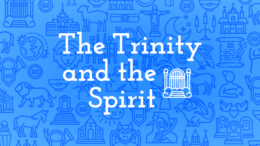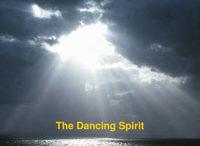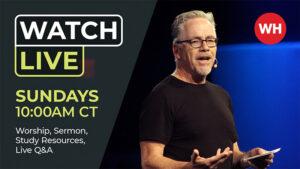Watch/Listen
Topic: Trinity

Singing to God
The 24 elders in the throne room who sing praises to God show us that corporate worship is a distinctive feature of God’s people. Why is this important? What does this mean when corporate singing is uncommon outside of the church? Greg addresses these questions and provides practical guidance for ways that praising God can become a central part of … Read More

The Trinity and the Spirit
When John enters the throne room in Revelation 4 and 5, the Father and Son are evident, but the Spirit is depicted as the seven eyes of the slain lamb. What does this imagery tell us about God’s triune nature and what can we learn about the role of the Holy Spirit? These are the questions addressed by Greg in … Read More

Dancing With God
In Revelation 4, the 24 elders lay down their crowns and fall before God’s throne. This sermon explores how such acts are typically performed out of fear, but here it’s actually a reflection of the kind of love that they see in the life of Jesus, and a participation in the triune dance of God’s eternal being.

The Faithful Witness
Our focus scripture states that God relates to creation in time, through the past, in the present, and toward the future that is to come. He walks with us in relationship, as is demonstrated throughout the Old Testament. This eternality of God is applied to Jesus in Revelation, highlighting the divine transcendence of the slain lamb.

Who Is The Spirit?
This second sermon in our God in Us series focused on the broad question of, “Who is the Spirit?” This message focuses on three characteristics of the Holy Spirit: The Holy Spirit is God, The Holy Spirit is personal and the Holy Spirit is distinct in nature. Greg emphasized that the main role of the Spirit is to show us clearly the person of Jesus and help us to recognize God when we would have no other way of recognizing Him. The Holy Spirit is working to remove the veil in our mind and can do this through our imagination. Read More

Mixtape: John 16:5-15
Early Church fathers said that every movement of God toward us begins with the Father, comes through the Son, and is accomplished in the Holy Spirit, while every genuine movement of humans toward God originates in the Holy Spirit, and goes through the Son to the Father. So if God’s movement toward us is accomplished in the Holy Spirit, and if our genuine moves toward God originate in the Holy Spirit, then we need this Spirit! Today we learn more about the Holy Spirit, and why Jesus left the earth so the Holy Spirit could come and fill it – and us – with God’s love! Read More

The Squishing God
Jesus is our hope of glory. But what does that mean? In this sermon, Greg talks about how we yearn to embrace and be fulfilled in life. He also talks about how we can surrender to God in order to be embraced. Read More

Participating in the Trinity
Elizabeth was filled with the Holy Spirit when she was greeted by Mary, the mother of Jesus. To be filled or immersed in the Holy Spirit is a phrase often quoted, but what exactly occurs when we experience this filling? The role of the Holy Spirit is to connect our spirits with the divine nature so that we actually participate with God in His life. The goal of discipleship is to see yourself as you really are. See yourself as defined by Christ, as participating in God’s self-relationship, the divine nature. When this is your self-image, all other sources of self-esteem become petty. Read More

The Dancing Spirit
When Mary greeted Elizabeth, she was filled with the Holy Spirit. One of the central characteristics of the Kingdom Jesus inaugurated is that people would be immersed in the Holy Spirit. This Holy Spirit is not a sub-diety; He is the third person of the Trinity, three persons but one God. There are five biblical facts that substantiate the reality of the Trinity: 1.The Bible names that Father as God. 2.The Bible states that the Son is God. 3.The Bible also refers to the Holy Spirit as God. 4.The Father, Son and Spirit interact with one another. 5.The Bible makes it clear that there is only ONE God. Read More

Longing for Perichoresis
The term “perichoresis” was used by the church many hundreds of years ago to describe the inner life of God, which includes the Father, Son and Holy Spirit fully knowing one another. This is sometimes artistically illustrated by a divine dance, which God wants us to become a part of as well. In Christ, God has made a way to include us in the dance even though we do not deserve to be included, and we persistently resist the movements required (full transparency, self-sacrifice, interest in the other over ourselves, etc.). Read More


